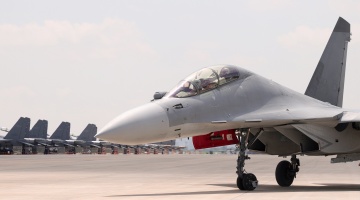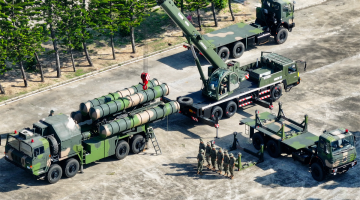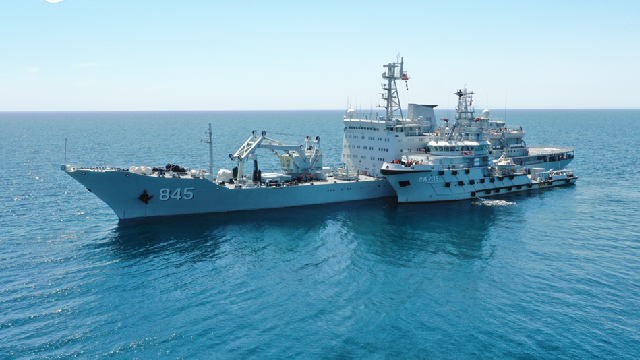By Liu Leina
On May 22, France accomplished a successful test launch of an upgraded ASMPA-R missile capable of carrying a nuclear warhead, by using a Rafale fighter jet. This demonstration highlighted France's nuclear deterrence capability. Analysts argue that, being the sole EU member possessing nuclear deterrence capability, France is showcasing its military technological prowess while gradually pushing forward the adoption of a strategy for European defense autonomy.
Winning over allies through a new initiative
In recent days, French President Emmanuel Macron has championed European defense autonomy on several occasions. During a speech at Sorbonne University in Paris on April 25, Macron, while highlighting the need to build a powerful Europe, proposed the building of a "credible defense for the European continent" in collaboration with NATO. Foreign media outlets characterize this as Macron's latest position regarding the "NATO's European pillar", signaling a shift away from pursuing autonomous European defense and towards advancing European defense with NATO's backing.
During his address, Macron proposed an initiative aimed at urging the EU to develop a unified defense strategy in the upcoming months. He suggested that in the face of security threats to EU member states, they should activate a support mechanism to deploy personnel and establish a rapid reaction force within a designated timeframe. Macron stressed that while the new force could receive military assistance from NATO, it must uphold independent command and operations.
Boosting momentum through "combination punches"
As Macron champions European defense autonomy, the French military is employing a slew of strategic "combination punches" to underscore its defense capabilities and reinforce confidence in the prospect of European defense autonomy.
In March, France hosted the "VOLFA-2024"multinational joint air combat exercise. The French Air Force conducted joint drills with the air forces of Spain and Portugal, practicing emergency deployment of air combat forces to countries like Romania. At the end of April, the French Navy conducted its first-ever coordinated cruise missile strikes from different locations and platforms. In June, the French Navy is slated to conduct similar joint strike exercises with the naval forces of the US and the UK.
Besides flexing its muscle, France also announced a landmark cooperation agreement with Germany, marking the official launch of a new-generation main battle tank program. French Defense Minister Sébastien Lecornu stated that this cutting-edge weapon system signifies a long-term investment in European defense autonomy for the foreseeable future. European defense experts observe that France's initiatives are spurred by concepts such as the "war economy" and "European priorities" in the defense sector. They aim to facilitate the sharing and utilization of regional resources within the framework of European defense autonomy, thereby fostering enhanced cooperation among European defense forces.
As France boosts its military capabilities, it also intensifies its diplomatic cooperation efforts. Notably, it has inked a memorandum of understanding on defense cooperation with the Philippines, and commenced negotiations on the Japan-France Reciprocal Access Agreement. These strategic moves are all geared towards continually widening France's sphere of influence.
Facing obstacles on the road to autonomy
For quite some time, France has stood as a steadfast proponent of European defense autonomy. From openly criticizing NATO's "brain death" to advocating for the ambitious plan for the "European army", and now proposing European defense development under NATO's auspices, France has adjusted its strategy all the time, aiming to seek support from fellow NATO European member states. Nevertheless, the journey towards European defense autonomy continues to encounter obstacles.
Externally, skepticism among NATO allies poses a big obstacle to Europe's efforts to achieve breakthroughs in weapon development, procurement, and joint operational capability building. Moreover, European defense autonomy requires substantial financial investment, yet the European debt crisis has laid bare fiscal deficits in various countries. Coupled with recent crises like the refugee influx, the COVID-19 pandemic, and the Ukraine crisis, financial resources are strained, making it hard for the EU to establish a fully independent defense system.
Internally, there is a lack of domestic support. France is currently contending with challenges such as high unemployment, low incomes juxtaposed with high prices, and insufficient social welfare, all of which have sparked ongoing mass protests. The French citizens now place greater emphasis on government initiatives aimed at enhancing their living standards rather than further increasing military spending.









